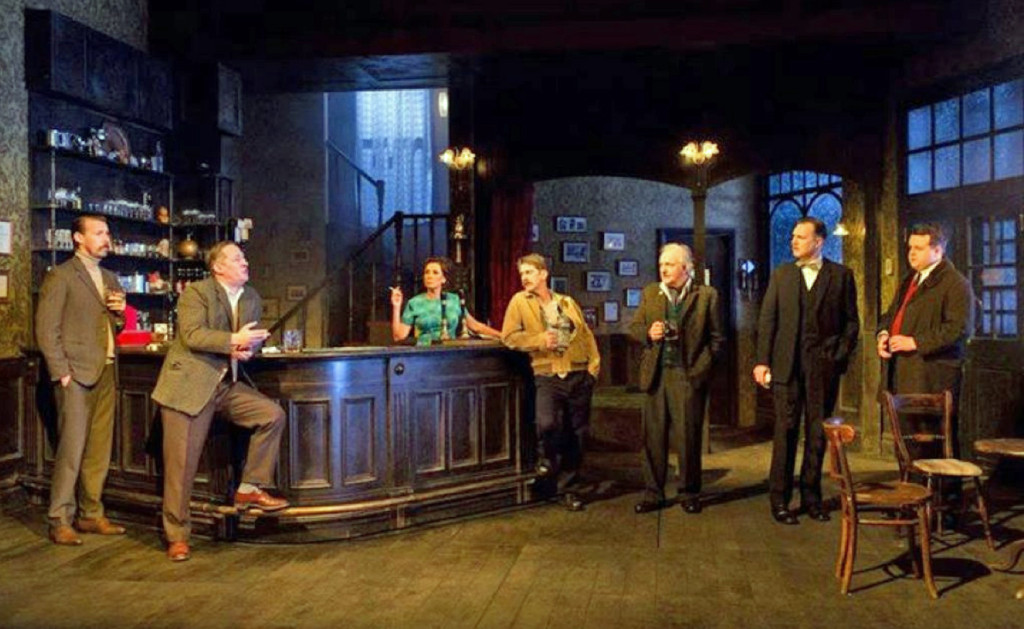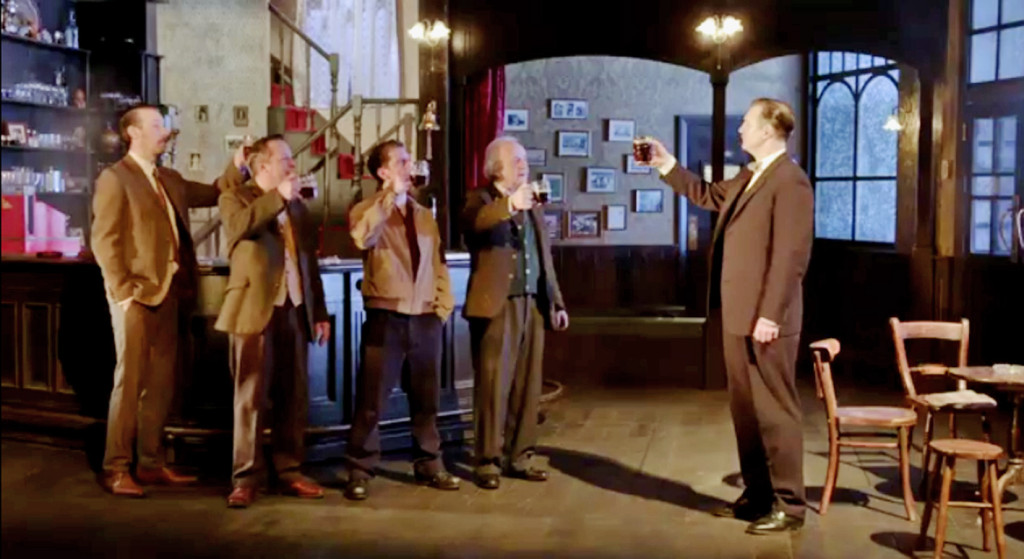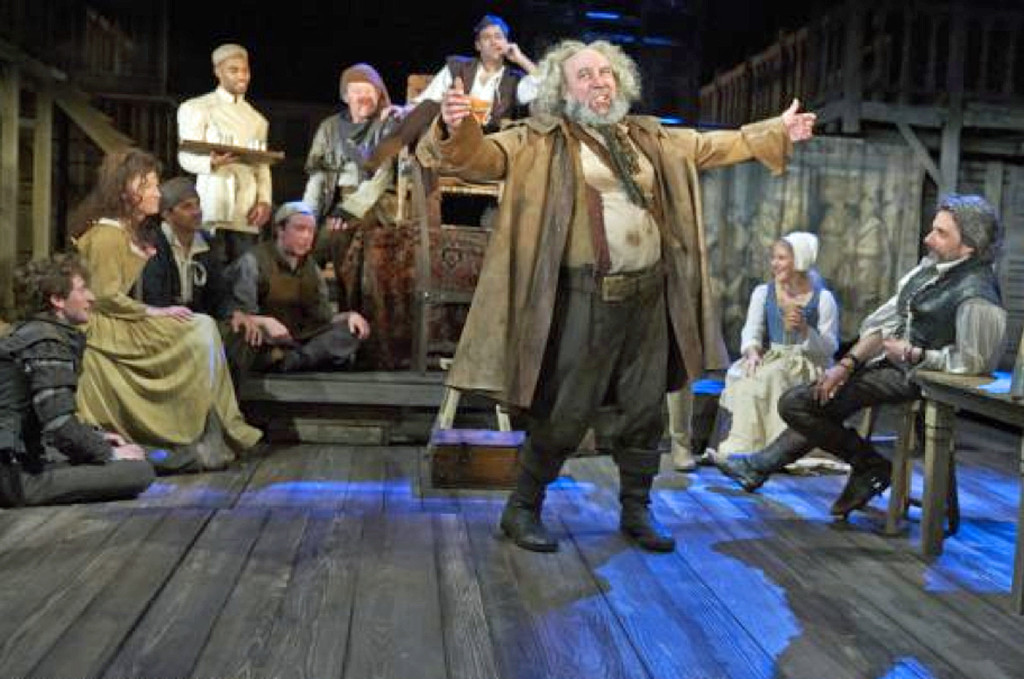To the Wyndham’s Theatre in the West End to see Hangmen, by Martin McDonagh, a play set almost entirely in the public bar of a pub in Oldham in 1965. If you go to see it yourself – and you don’t have to come up to that London, it’s being shown live at more than 700 cinemas across the country on Thursday March 3, as part of the National Theatre Live initiative – I strongly recommend you have a couple of beers beforehand. Watching realistic-looking pints of mild and bitter being poured regularly from genuine handpumps and drunk onstage with signs of great pleasure brought on in me an aching desire to get up there with the actors and join in.
Martin McDonagh, who was born in Britain to Irish parents, became famous for a string of plays with Irish rural settings, including The Cripple of Inishmaan, and also for the screenplay to In Bruges, the gangster black comedy featuring Brendan Gleeson introducing incompetent hitman Colin Farrell to the pleasures of Belgian beer. Hangmen is a very different venture, based semi-biographically on Harry Allen, one of Britain’s last hangmen, who kept several pubs in Lancashire while performing the part-time post of sending people through trapdoors to their deaths. McDonagh calls him “Harry Wade”, using the surname of another hangman, Stephen Wade, and the play opens in the execution cell with Wade trying to get “James Hennessey” (clearly based on James Hanratty, one of Harry Allen’s genuine victims) to go to the last drop quietly and swiftly, while Hennessey continues to insist on his innocence.

A switch of scene and the audience is now staring at a fine imitation of a North of England urban pub interior from the middle of the last century, where Harry, played by the excellent David Morrissey and his wife Alice, rule contemptuously over a sad and sorry line-up of regulars. There isn’t a pub-goer over 50 who has not known a landlord just like Harry Wade, bow-tied and sergeant-majorly, nor a landlady like Sally Rogers’s Alice, attempting to camouflage advancing years with far too much make-up. Hanging has just been abolished, and the Oldham Gazette is sending its reporter round to interview Harry, “the second-best hangman in Britain” – number one, of course, being that other Manchester-area pub landlord Albert Pierrepoint – to see how he feels.
Pierrepoint’s pub, the ironically named Help the Poor Struggler, really was in Oldham, or Hollinwood to be exact, some two miles away, and it was owned by Groves and Whitnall of Salford. Harry Allen ran at least three pubs, the Rawsons Arms in Peel Street, Farnworth, near Bolton, 11 miles from Oldham, a Burtonwood pub nicknamed “the Stump”, in the 1940s (Allen’s Farnworth pub is sometimes given incorrectly, as the Rope and Anchor: I’m not sure there WAS a Rope and Anchor in Farnworth); the Junction, Higher Lane, Besses o’ th’ Barn, Whitefield, seven miles from Oldham, in the 1950s, which was owned, I believe, by the Crown Brewery, Bury, taken over by Dutton’s of Blackburn in 1960; and another Crown Brewery pub acquired by Dutton’s, the still-open Woodman Inn, Wood Street, Middleton, four miles from Oldham, from 1962 to 1965 (Thanks due to Peter Alexander for information on that one). On stage at the Wyndham’s, Harry Wade’s pub contains little to identify its owners, though from where I sat in the middle of row D you could see what looked like “OB”, presumably for Oldham Brewery, on the pub doors when they were pushed open.
Giving Harry Wade a pub Harry Allen never had, tied to a brewery Harry Allen was never tied to, is barely a misdemeanour in the very long list of theatrical crimes against authenticity, of course, and was done for dramatic purposes, as you’ll see if you watch the play: rather more liberty with reality was taken when McDonagh gave Harry Wade ten times the number of hangings that Harry Allen carried out, though again this was for dramatic purposes. Pub historians will not have much to complain about the staging, though: I suspect straight glasses, rather than dimples, would have been used in a real Oldham pub in 1965, and the bitter looked a little too amber and definitely too flat for a real North West of England brew at the time (though the mild was authentically dark as Barber Booth in a blackout. There was, too, plenty of smoky fug being puffed across the stage, and much use of the on-the-wall cigarette machine. Smokers, too, may wish to get well nicotined-up before seeing the play.
Even if you’re interested in plays, rather than pubs, Hangmen is certainly worth seeing: plenty of McDonagh’s darkly pointed, thought-provoking humour (“How many people did you hang, Harry? More than a thousand?” “Don’t be daft, lad, this isn’t China!”), and enough dramatic twists to keep you awake even if you DID have a couple of pints before the play started. There are a couple of areas where the plot could be sharpened up, but overall it’s a four-star drama, and David Morrissey (who displays a talent for comedy you might not think was there if you only knew him from his role as The Governor in The Walking Dead) and the rest of the cast are uniformly and pleasurably exactly on target for personality, place and time.

How many other plays are set entirely, or almost entirely, in a pub or bar? Strangely, this appears to be almost exclusively an Irish idea. At least a couple of world classics fit the genre: the Irish-American Eugene O’Neill’s The Iceman Cometh, where the action happens in Harry Hope’s run-down saloon bar in 1912 New York, and The Playboy of the Western World, by JM Synge, which takes place in Michael James Flaherty’s shebeen in Mayo around 1907. One whole act of Sean O’Casey’s The Plough and the Stars is set in a Dublin pub in 1916. Conor McPherson’s highly regarded The Weir from 1997, which I’m ashamed to say I have not seen, is set in a bar in rural Ireland.
Who’s playing (pun semi-intended) for England? There’s Jeffrey Bernard Is Unwell by Keith Waterhouse from 1989, of course, where the eponymous Spectator journalist finds himself locked overnight in his favourite home, the Coach and Horses in Soho, and other characters from his past drift through like ghosts. The British-based Nigerian novelist and playwright Biyi Bandeele wrote a play called Happy Birthday, Mr Deka D in 1999 that is set (I’m nicking this from Steven Earnshaw’s The Pub in Literature) in an “absurdist, always closed/always open public house”. But those apart, as far as I can discover, you have to go back several centuries to find more English pub-plays. Oliver Goldsmith’s She Stoops to Conquer from 1773 opens at an alehouse, the Three Pigeons, then moves on to a mansion that two of the main characters have been fooled into thinking is an inn, “and hilarity ensues”. Does that count? Mind, Goldsmith was born in Ireland …
Earlier, in 1728, John Gay set Act II of The Beggar’s Opera, in “A Tavern near Newgate”, where Captain Macheath and his gang of robbers hang out; and George Farquhar’s The Beaux’ Stratagem from 1707, opens in Will Boniface’s inn in Lichfield, where the landlord boasts of the local brew:
Boniface: What will your honour please to drink, as the saying is?
Aimwell I have heard your town of Lichfield much fam’d for ale. I think I’ll taste that.
Boniface: Sir, I have now in my cellar ten tun of the best ale in Staffordshire: ’tis smooth as oil, sweet as milk, clear as amber and strong as brandy, and will be just fourteen years old the sixth day of next March, old style.
But guess what? Young Farquhar, too, plays for the boys in green, having been born in Derry.
Going further back, Ben Jonson wrote a play in 1629 called The New Inn set in a fictitious inn called the Light Heart in Barnet, which was apparently so badly received it was “hissed from the stage” on its first night, though with a plot so Byzantine it included a man falling in love with a boy disguised as a girl, and marrying him/her, only for it to turn out all right because the boy was really a girl in the first place, while the woman who was the boy/girl’s nurse turns out to be his long-lost mother, and also the missing wife of the inn’s landlord, who is himself a Lord in disguise … this does not surprise.
And finally we come to Shakespeare. There is a less-well-known hostelry that actually begins a Shakespeare play: the “alehouse on a heath” where a drunk Christopher Sly falls asleep before being carried to the house of “a Lord” and having The Taming of the Shrew performed before him. But the Boar’s Head, Eastcheap, where the young Prince Hal hung out with Sir John Falstaff and his cronies, drinking from a sack while waiting for his parents, Henry IV parts 1 and 2, to pop their sabatons, is possibly the most famous tavern in English literature, and certainly the one that has been portrayed on most theatre stages.


Bit before my time, but some of the old boys fondly remember Allen’s time at the Junction. He was landlord 1952-1963 and there are many stories of his time there. What I really would have liked to see were the two murals of the Old Bailey and Newgate Gaol that he had painted on the walls of the upstairs sitting room.
That’s extremely interesting, thank you …
Hi Martyn – JB Priestley’s ‘I have been here before’ is set in the bar of a pub on the North Yorkshire moors and was first performed at the Royalty theatre in September 1937. I saw it at the West Yorkshire Playhouse in Leeds about 30 years ago and despite being an avid collector I’m damned if I can find the programme. However Wikipedia claims it was performed on BBC TV’s Play of the Month in May 1982 and also on BBC radio. I remember it being one of Priestley’s ‘time’ plays (like An Inspector Calls). In my book A Haunt of Rare Souls I suggest Priestley may have taken the Fox and Hounds at Ainthorpe in Eskdale as his pattern, a pub which dates from 1555 and he names the Black Bull. I saw another play at the Playhouse set in the round and in a pub from Hull, with I think only two characters. It wasn’t very good and I have no lasting memories including the title. My most enjoyable pub/bar style play from the excellent WYPlayhouse was The Playboy of the Western World.
Thank you very much, Barrie, that’s great. I have, of course, got A Haunt of Rare Souls, but it’s some years since I read it, and I shall go and re-read it immediately.
The Brother, an adaptation of Brian O’Nolans / Flan O’Briens / Myles na gCopaleens works performed by Eamonn Morrissey is a one man show set in the snug of a Dublin pub. Well worth a viewing.